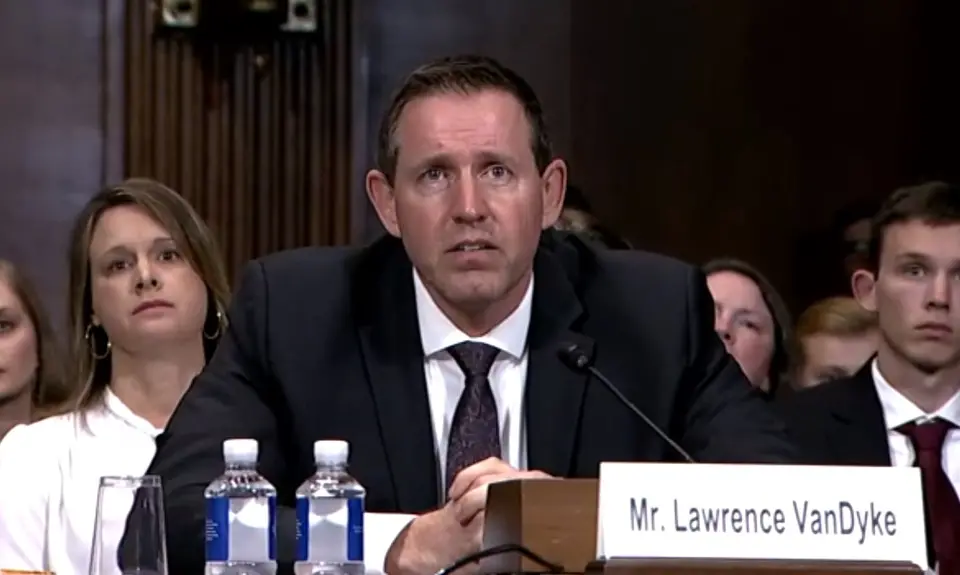“Confirmed Judges, Confirmed Fears” is a blog series documenting the harmful impact of President Trump’s judges on Americans’ rights and liberties. Cases in the series can be found by issue and by judge at this link.
Trump Ninth Circuit judge Lawrence VanDyke tried to affirm a lower court decision that dismissed, without a trial, a female professor’s contention that her university violated federal law by paying her substantially less than male counterparts. The other two judges on the panel, both of whom were nominated by President George W Bush, rejected VanDyke’s argument and partly reversed the lower court ruling so that the professor could present her claims to a jury in the March 2021 case of Freyd v University of Oregon.
Jennifer Freyd is a professor of psychology at the University of Oregon, and a “well-recognized academic and pioneer in trauma studies.” Nevertheless, the University pays her “several thousand dollars less per year” than four of her male colleagues, even though they are all of “equal rank and seniority.”
After Freyd learned of the pay disparities and the University denied her a raise, she filed suit, contending that, among other things, the University was discriminating against her in violation of the federal Equal Pay Act and Title VII, the federal law prohibiting job bias. After discovery, the lower court dismissed Freyd’s complaint on summary judgment without a trial.
On appeal, all three judges on a Ninth Circuit panel agreed that Freyd should be able to present her claim concerning violation of the state equal pay law to a jury. In addition, conservative George W Bush appointee Jay Bybee wrote a 2-1 decision, joined by another Bush appointee, reversing the lower court concerning key federal claims by Freyd.
Specifically, Bybee ruled that although there were some differences among the jobs performed by the professors, a “reasonable jury could find” that Freyd and her colleagues “perform a ‘common core of tasks’ and do substantially equal work,” so that the university is violating the federal Equal Pay Act. In addition, Bybee explained, a jury could determine that the university is also discriminating in violation of Title VII because of a department-wide practice of granting “retention raises” to predominantly male faculty being courted by other universities, which has a department wide “disparate impact” against women, who are “less likely” to obtain such raises.
Trump judge VanDyke dissented. He asserted that once “the full picture of duties and skills” are considered, the court should conclude that “the jobs cannot be substantially equal as a matter of law” and so the court should agree to dismiss the federal Equal Pay Act claim. In addition, he maintained that Freyd’s statistical evidence of disparity was insufficient because of the relatively small size of the psychology department, and that, in any event, the court should uphold the “retention raises” policy as a proper “job-related” and “market-driven” practice under Title VII.
Judge Bybee showed what was wrong with VanDyke’s arguments. He acknowledged that a jury could reach a similar conclusion as VanDyke, but that was a question for the jury, not an appellate judge. VanDyke’s effort to “pick through the facts” to find differences among the professors, Bybee went on, “would gut the Equal Pay Act” and contradicts the fact that the university itself regularly makes similar comparisons “for purposes of setting salaries.” As to the Title VII claim, Bybee continued, it is again up to the jury as “the fact finder, not the trial court” or appellate court, to determine whether the statistics as presented by Freyd’s expert were sufficient, or whether to believe the university’s experts who disagreed, particularly since the psychology department’s own “self-study” suggested there was a disparity between male and female professors. It was similarly up to the jury to decide whether the “retention raises” policy qualified as a “business necessity” that can excuse disparate impact under Title VII. Bybee pointedly noted that VanDyke’s “strong preference” for the “market-driven practice” of giving retention raises was “a policy question better addressed to the need for Title VII” as determined by Congress, not to a court.
As a result of Judge Bybee’s decision, Professor Freyd will be able to present her federal claims of pay discrimination based on gender to a jury to resolve. If it had been up to Trump judge VanDyke, however, those claims would have been dismissed, and both the Equal Pay Act and Title VII would have been weakened as protections against improper job discrimination.
